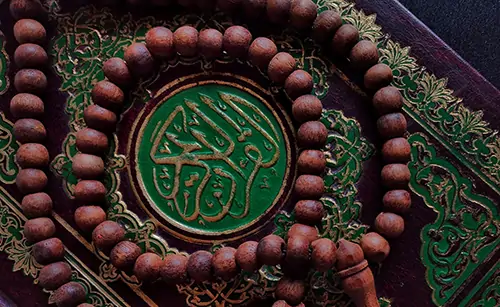The Concept of Taqwa in the Quran and Sunnah

When Muslims hear the word Taqwa, the first thought that comes is fear of Allah. But the true taqwa meaning in Islam goes much deeper—it is about living every moment with God-consciousness, knowing that Allah (سُبْحَانَهُ وَتَعَالَى) sees and knows everything.
Imagine walking on a path full of thorns. Every step you take, you carefully lift your garment so it does not get torn. That is taqwa in Islam—protecting yourself from disobedience by being mindful of Allah at all times.
What is Taqwa?
The Definition of Taqwa in Arabic comes from the word waqayah, which means protection or shield. So, taqwa means building a shield between yourself and the anger of Allah by obeying His commands and avoiding His prohibitions.
The Prophet Muhammad (ﷺ) once said:
“Taqwa is here,” and he pointed to his chest three times. (Sahih Muslim, Hadith 2564)
This shows that taqwa is not just about outward actions, but about the state of the heart.
Taqwa in the Quran
The Quran verses about taqwa emphasize its importance as the foundation of faith. Allah says:
“Indeed, the most noble of you in the sight of Allah is the one with the most taqwa.”
(Quran 49:13)
Here, Allah reminds us that honor is not in wealth, race, or power—it is in taqwa.
Another verse beautifully defines it:
“And take provisions, but indeed, the best provision is taqwa. So fear Me, O you of understanding.”
(Quran 2:197)
This verse tells us that just like we pack food for a journey, the best journey to the Hereafter is prepared with taqwa.Studying Quran verses about taqwa with proper Tafseer can help you implement them in daily life. Our Quran Course is designed for this purpose.
Taqwa in the Sunnah
In the Sunnah, the Prophet Muhammad (ﷺ) often reminded his companions about taqwa. In his famous farewell sermon, he said:
“I advise you to fear Allah (ittaqullah), listen and obey, even if a slave is appointed as your leader.” (Sunan Abi Dawood 4607)
This shows that taqwa in Islam is not only about personal piety but also about building a just and united society.

Why Taqwa Matters in Islam
- Closeness to Allah – Taqwa strengthens your relationship with Allah.
- Guidance – The Quran says: “This is the Book about which there is no doubt, a guidance for those who have taqwa.” (Quran 2:2).
- Forgiveness and Mercy – Allah promises: “Whoever has taqwa of Allah, He will make for him a way out and provide for him from where he does not expect.” (Quran 65:2-3).
- Success in both worlds – The Prophet ﷺ said: “Nothing will enter people into Paradise more than taqwa and good character.” (Sunan al-Tirmidhi 2004)
How to Develop Taqwa in Daily Life
- Remember Allah often (dhikr)
- Read and reflect on Quran verses about taqwa
- Follow the Sunnah of the Prophet ﷺ
- Control your desires and avoid sins
- Make dua for taqwa as the Prophet ﷺ himself prayed:
“O Allah! Grant me taqwa and purify my soul, for You are the best to purify it.”
(Sunan al-Nasa’i 1306)
How is Taqwa and Ramadan Related?
Ramadan is not just about fasting from food and drink; it is about fasting from sin and drawing closer to Allah. Allah Himself says in the Quran:
“O you who believe, fasting is prescribed for you as it was prescribed for those before you, that you may attain taqwa.”
(Quran 2:183)
This shows that the main purpose of fasting in Ramadan is to develop taqwa in Islam. Every time we control our hunger, anger, or desires, we are training our hearts in taqwa meaning God-consciousness. Ramadan acts like a spiritual bootcamp—it softens the heart, strengthens discipline, and makes us more mindful of Allah in every action.
Ways to Work on Taqwa
Building taqwa in Islam is a lifelong journey, but here are simple steps you can start today:
- Strengthen Salah – Never miss your five daily prayers; they keep your connection with Allah alive.
- Read Quran Daily – Reflect on Quran verses about taqwa to remind yourself of Allah’s guidance.
- Control the Tongue – Avoid backbiting, lying, or harsh speech, as these weaken taqwa.
- Make Dua for Taqwa – The Prophet ﷺ would ask: “O Allah! Grant my soul its taqwa and purify it.” (Sunan al-Nasa’i 1306).
- Choose Halal over Haram – Even when no one is watching, remember that Allah sees all.
- Practice Gratitude and Patience – Both are signs of true taqwa.
- Fast Voluntarily – Beyond Ramadan, fasting on Mondays, Thursdays, or the white days (13th, 14th, 15th of each lunar month) helps strengthen taqwa.
Conclusion
The meaning of taqwa in Islam is not just fear, but love, awareness, and mindfulness of Allah. It is a way of life that makes every action—big or small—an act of worship.
When the Quran says, “O you who believe, have taqwa of Allah as He should be feared, and do not die except as Muslims” (Quran 3:102), it is a reminder that taqwa is our lifelong journey.
The real question we should ask ourselves today is: Do I live with taqwa, knowing Allah is watching me? If yes, then every moment becomes an opportunity for Jannah.
FAQs About Taqwa in Islam
What is Taqwa in Islam?
Taqwa in Islam means being conscious of Allah, obeying His commands, and avoiding what He has forbidden. It is a shield that protects believers from sin and leads them closer to Allah.
What does Taqwa mean in Arabic?
The word Taqwa in Arabic comes from waqayah, meaning protection or shield. It refers to protecting oneself from Allah’s displeasure through obedience and piety.
What does the Quran say about Taqwa?
The Quran says: “Indeed, the most noble of you in the sight of Allah is the one with the most taqwa” (Quran 49:13). It highlights that true honor comes from taqwa, not wealth or status.
How can Muslims practice Taqwa in daily life?
Muslims can develop taqwa by remembering Allah often, performing salah, reading Quran, following the Sunnah, and avoiding sins. The Prophet ﷺ also made dua for taqwa, teaching us to seek it from Allah.
Why is Taqwa important in Islam?
Taqwa is important because it brings Allah’s mercy, guidance, and forgiveness. The Prophet ﷺ said: “Nothing will enter people into Paradise more than taqwa and good character.” (Sunan al-Tirmidhi 2004).














